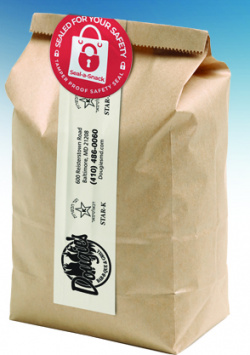Non-Jewish Food Vendors
From Halachipedia
Revision as of 00:41, 16 July 2019 by Yonatanf89 (talk | contribs)
General
- From the Torah law, any time a piece of meat is found and one is unsure whether it is kosher or not, one may rely on majority. If majority of the butchers in town sell kosher meat, then one may presume that it is kosher. However, the Rabbis forbid any piece of meat that wasn't kept in sight of a Jew except in certain cases. [1]
- If a piece of kosher meat left one's eyesight it is presumed to be non-kosher unless it has a unique identifying mark, one recognizes its look and one is certain that it is the same piece of meat, or it was wrapped and sealed. [2]
Nowadays
- The Ashkenazic minhag is that anytime one leaves a piece of meat and finds it in the same place that one left it, it is presumed to be kosher. [3]
- For Sephardim, if one left meat in one's house and one's windows are closed so that birds can't come in, or if the meat was covered and remained covered, it is kosher. [4]
==Buying Meat From Non-Jews
- The Rabbis established that it is not permitted to (buy and) eat any meat that a non-Jew has in their possession, even if all the meat stores and slaughterhouses in the area are Kosher. This is even true if it is known that the non-Jew bought the meat from a Jew, because of Basar Shenitalem Min Haayin.[5] However, there are some that disagree with the last point, and believe that if it is known that the non-Jew bought the meat originally from a Jew, then it is okay to (buy and) eat, if there was no way for the non-Jew to switch the meat.[6]
- It is okay to buy (Kosher) meat from a non-Jewish vendor if the vendor makes sure to sell them with the proper double-seal from the Jewish distributors, given that the type of double-seal is well-known.[7] Rabbi Moshe Feinstein explains that if the storeowner switched the meat and forged the double-seal of the Kosher butcher, then he would miss out on selling the pieces of Kosher meat for a more expensive price.[8]
Sources
- ↑ Shulchan Aruch YD 63:1
- ↑ Shulchan Aruch YD 63:1, Yalkut Yosef YD 63:2
- ↑ Rama YD 63:2 writes that the minhag is to assume that as long as the piece of meat is in the same place as it was earlier, it is the same piece of kosher meat. Be'er Heitiv YD 63:6 cites a dispute between the Shach who follows the Rama and the Taz who is even more lenient. Aruch HaShulchan YD 63:9 also rules like the Rama.
- ↑ Yalkut Yosef YD 63:1
- ↑ Shach Y.D. 118:5, Chochmat Adam Klal 27:12
- ↑ see the Shach Y.D. 118:5 who quotes the Levush who is Meikil
- ↑ Iggrot Moshe Y.D. 1:56
- ↑ Iggrot Moshe Y.D. 1:56
